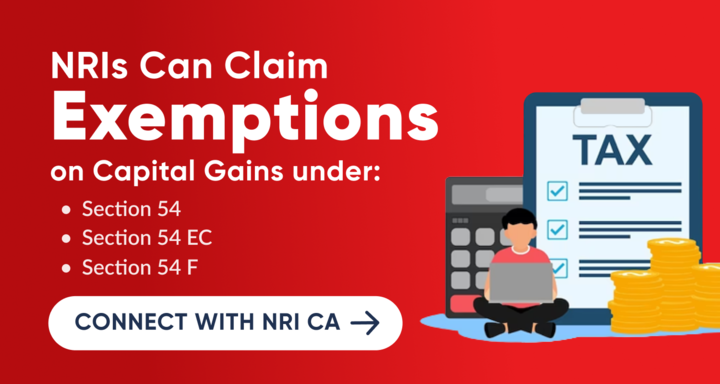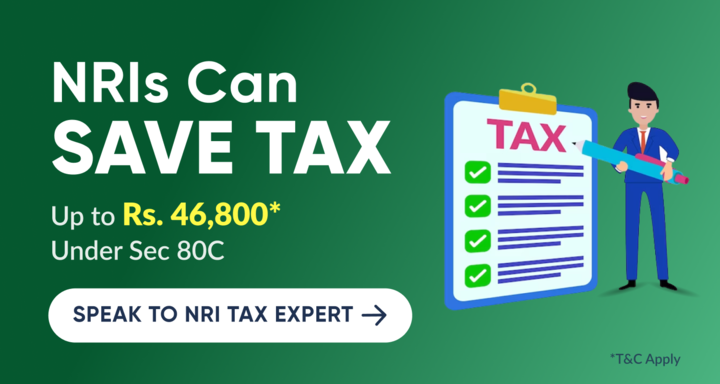An NRO account is designed to manage an NRI’s Indian income, including rent, investments, and other earnings. NRIs are liable to pay taxes on income deposited in an NRO account in India. However, it is crucial to explore opportunities to minimize taxes payable on these accounts. In this blog, we will discuss how can NRIs lower taxes payable on NRO account.

How is NRO Account Taxed in India?
According to the income tax regulations, both the principal amount and the interest earned on an NRO account are subject to full taxation in India. Tax deduction at source (TDS) is applicable on funds in an NRO account. Under the provisions of the Income Tax Act of 1961, the interest income generated from an NRO account is taxed at a rate of 30%, along with any applicable cess and surcharge.
How can NRIs Lower Taxes Payable on NRO Account?
NRIs can lower tax on NRO Accounts in the following ways-
- Under Section 80TTA of the Income Tax Act, 1961, NRIs have the provision to claim a tax deduction on interest income of up to Rs. 10,000 from their NRO savings account in a financial year. This implies that if the total interest income earned from one or multiple NRO savings accounts in a financial year is below Rs 10,000, NRIs can request an income tax refund for that amount.
Note- It’s crucial to understand that this deduction is specifically applicable to the interest earned on NRO savings accounts and does not apply to interest income from NRO fixed deposits.
- NRIs can also claim benefits of DTAA that is Double Taxation Avoidance Agreement. To put simply, the Double Taxation Avoidance Agreement (DTAA) is an agreement between India and over 85+ countries, aimed at preventing NRIs from being taxed twice on the same income in more than one country.
- Tax deduction on NRO accounts can also be done through Section 80C of the Income Tax Act. Opting for tax-saving instruments such as ULIPs, ELSS, etc. can help NRIs in reducing their tax liability.
- Under Section 80D, NRIs have the opportunity to avail tax deduction for the premiums paid towards health insurance policies.
- NRIs can also benefit from tax deduction for the interest paid on education loans under Section 80E.
- Under Section 80G, NRIs can claim tax deduction for all eligible donations made.
- NRIs should be aware that they can also benefit from the NPS (National Pension System) to save taxes on their NRO accounts. The NPS is a government-supported pension scheme that enables investors to claim tax deductions of up to Rs. 50,000 under Section 80CCD(1B) of the Income Tax Act.

What is DTAA?
If an NRI is a resident of a country that has a Double Taxation Avoidance Agreement (DTAA) with India, he/she has the opportunity to benefit from a reduced TDS rate. This can effectively lower their tax liability. The DTAA rates vary from country to country and for most countries the tax rates range from 10% to 15%.
To take advantage of the lower tax rate provided by the DTAA, NRIs will need to submit certain documents to the bank, which include:
- A PAN card attested by the account holder.
- A Tax Residency Certificate (TRC) issued by the tax authorities of the country of residence.
- Form 10F, a self-declaration form that should be filled out by an NRI.
How can NRIs take Benefit from DTAA?
NRIs have two ways to benefit from DTAA, as outlined below:
- Tax Credit Method: Under this approach, the home country allows an NRI to receive a tax credit for the tax paid in the source country where the income was earned.
- Tax Exemption Method: Under this approach, the income is taxed in one country and exempted in another country.
These methods, either through DTAA tax credits or DTAA exemption method, aim to prevent the NRI from being subjected to double taxation on the same income in both the source and home countries.
How can NRIs Claim Deduction under Section 80TTA?
To claim a deduction under Section 80TTA, NRIs can follow the steps outlined below:
- NRIs should add their total interest income under the ‘Income from Other Sources’ category when filing their income tax return.
- Then, they should calculate their gross total income for the relevant financial year by combining all their sources of income.
- Subtract the eligible amount under Section 80TTA from their gross total income.
Please note that if NRIs have opted for the new tax regime as per Section 115BAC, they will not be eligible to claim these deductions.
Other Tax Benefits on NRO Account
To avail tax benefits or refunds as an NRI, it is crucial to file an income tax return (ITR) in India. In cases where NRIs have utilized the maximum deduction limit mentioned in Section 80TTA, they can still claim deductions on their overall Indian income by utilizing different tax-saving sections while filing ITR.
For instance, if their total income earned in India is below Rs 2.5 lakh in a particular financial year, they can proceed with filing their return and request a refund for the tax paid on the NRO account.

Features and Benefits of NRO Account
Listed below are the some of the NRO account benefits and features:
- NRO accounts serve as a primary means to manage income earned in India, including rental income, dividends, pension, and other forms of domestic income.
- These accounts can be opened as savings accounts, current accounts, or fixed deposit accounts.
- NRO accounts are maintained in Indian Rupees (INR), and all transactions, including deposits and withdrawals, are conducted in INR.
- NRIs have the option to open NRO accounts jointly with other NRIs and with Indian residents, but only on a “Former or Survivor” basis.
- NRO account holders are subject to Indian income tax laws. The applicable Tax Deducted at Source (TDS) rate is typically 30% plus applicable surcharge and cess.
- There are restrictions on the repatriation of funds held in NRO accounts. As per regulations, individuals can transfer up to USD 1 million in a single financial year after fulfilling the necessary tax obligations.
Tax on NRO Account
Tax is applicable on various types of income in an NRO account, which include:
- Capital gains resulting from investments made by NRIs in India.
- Consulting fees or salary earned within India.
- Rental income generated from properties owned in India.
- Interest income earned from NRO accounts and deposits.
TDS Rates for NRO Account
Interest accrued or paid on an NRO account is subject to a fixed Tax Deducted at Source (TDS) rate of 30%. Additionally, a surcharge and education cess of 4% are applied. It is important to note that the surcharge rate varies depending on the total interest income, as indicated below:
- If the total interest earned on the NRO account is less than or equal to Rs 50 lakh, the TDS rate is 31.2% (30% TDS + 0% surcharge + 4% cess).
- For total interest earned between Rs 50 lakh and Rs 1 crore, the TDS rate is also 31.2% (30% TDS + 10% surcharge + 4% cess).
- If the total interest earned falls between Rs 1 crore and Rs 2 crore, the TDS rate increases to 35.88% (30% tax rate + 15% surcharge + 4% cess).
- For total interest earned between Rs 2 crore and Rs 5 crore, the TDS rate is 39% (30% tax rate + 25% surcharge + 4% cess).
- If the total interest earned exceeds Rs 5 crore, the TDS rate becomes 42.74% (30% tax rate + 37% surcharge + 4% cess).

Contact SBNRI
Due to a complicated tax system and recurrent amendments, understanding tax laws can be confusing and NRIs may be subject to additional fees or miss claiming deductions and other benefits. At SBNRI, we understand this struggle. You can download SBNRI App to connect with our NRI Tax Experts to know more about new TDS/ TCS rules for NRIs. You will also get end-to-end assistance related to NRI tax filing. SBNRI will also help you get a lower TDS Certificate. You can also click on the button below to ask any questions. Visit our blog and YouTube Channel for more details.
FAQs
An NRO (Non-Resident Ordinary) account is a type of bank account designed for Non-Resident Indians (NRIs) to manage their income earned in India, such as rent, investments, and other earnings. It is maintained in Indian Rupees (INR).
NRO accounts can be opened as savings accounts, current accounts, or fixed deposit accounts, depending on the needs of the NRIs who want to open an NRO account.
NRIs are required to convert their resident accounts to NRO accounts upon attaining NRI status. As per the provisions of the FEMA, any non-compliance with this requirement may result in penalties. In cases of violation, a penalty of up to three times the amount involved or Rs. 2 lakh (if the sum cannot be quantified) may be imposed. Furthermore, the account holder may be subject to a daily penalty of Rs. 5,000 from the date of the violation until the penalty is paid.



